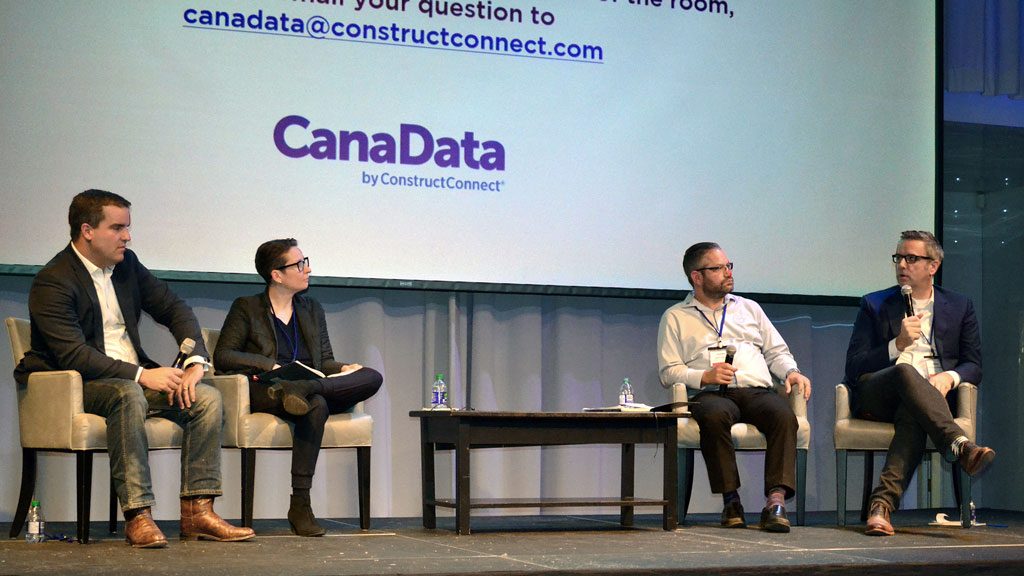The evolution of smart cities has brought about a number of challenges and risks, but also a number of opportunities, a panel of experts discussed at the recent CanaData conference in Toronto.
“I think a lot of the discussions we need to have about technology is not binary — this is good, this is bad — they are about tradeoffs and that requires discourse and dialogue and education,” said Bianca Wylie, co-founder of Tech Reset Canada.
“I’m really excited for what engineers and the history of engineering and the history of math and science can bring to the table. It is so needed right now, that we return to thinking about science, innovation and technology as things that are driven by math and science not by corporate interest. And I say that because of what is happening in the smart city context.”
She spoke about the Sidewalk Labs project on Toronto’s eastern waterfront, which she has been involved with extensively. Last year, Waterfront Toronto, a tripartite public corporation put out a tender for a partner to come up with a plan for a smart city neighbourhood. The RFP was won by Sidewalk Labs, which is a subsidiary of Alphabet, a sister company to Google.
“A year into a $50 million piece of work to make a plan for a smart city neighbourhood, no land has changed hands and it’s a year of planning what a smart city neighbourhood might look like,” said Wylie.
“Because we are not on the same page about complexities, opportunities and risks, fear is dominating the discourse. Surveillance and privacy are the overriding issues you hear about when people talk about smart cities and that’s unfortunate because there are much bigger and different things to talk about like control, economic development opportunities, power, but there are also things that are a bit hairy that we need to talk about like the social implications of smart cities like tracking and how data might be used.”
At every level of government in Canada nobody is quite sure what to do and there is a panic, she said.
“Governments are acting fast and trying to possibly regulate a little too quickly. There is no one solution to building a smart city or to using technology in an ethical way, it’s complicated,” said Wylie, adding one of the biggest problems is that politicians specifically are looking at them as economic development opportunities.
“We need to figure out what we can do in the short term, the medium and the long-term. This is the challenge that we have. Everyone in this room is part of the conversation for sure because everybody is involved in building.”
James Benham, CEO of JBKnowledge Inc., said as a councillor in a small town in Texas, he worked on a plan to make his city a smart city.
“It’s been really fascinating to watch this go into effect and really work and drive the cost of government down and drive efficiency up,” said Benham. “We digitized the entire planning and development services department, eliminated all the paper plans went to an all-digital plan file, streamlined the application process and cut it by double digits so we can build things and get them permitted faster and that’s step one.”
Jason Cohen, director of digital experience at CAD MicroSolutions, said it was important to define that there are different types of smart cities.
“(Sidewalk Labs) is the utopian smart city, it’s the ultimate digitize everything, automate everything and connect it all together,” said Cohen.
“The smart city James is talking about is a more practical version of that. We have to be careful with that term and how it’s being used because there are lots of great technological initiatives that complement each other in cities we’re in but I wouldn’t necessarily quantify that as a smart city. It’s a smarter city but I wouldn’t consider it like what Alphabet is trying to do.”
During a question and answer period, Toronto Construction Association president John Mollenhauer said the biggest challenge the industry has right now is that municipalities are bound by legislation to be transparent and get the best value. He asked the panel how to persuade municipalities to change their approach to procurement and get away from a hard bid system and the “notion that price and value are synonymous.”
Benham said his city moved to the construction manager at risk (CMR) method because they weren’t getting the best output out of hard bidding everything.
“By moving to CMR allowed us to consider all the other intangibles — the quality of their presentation, the quality of the technology, the quality of the contractor, their resume and their background,” explained Benham.
Dr. Rick Huijbregts, VP of strategy and innovation at George Brown College, said there are a few communities in Canada that are moving towards requests for innovation rather than requests for low cost.
“You actually can build digitally-enabled smarter buildings for less than conventional construction because you are actually eliminating a lot of proprietary systems and proprietary infrastructure. The technologies are there to generate savings,” he noted.
Wylie said this is an opportunity to set out a smart city protocol and encouraged everyone to get involved with the bodies that establish those standards.
“One of the big lessons from the smart city project that is going on now is that the standards weren’t set, the guardrails weren’t there,” Wylie noted. “The cities haven’t defined what you had to have done to even bid on the RFP, so I think a big opportunity now is how do you set the standards so people have confidence in the IOT (Internet Of Things) protocols for security.”











Recent Comments
comments for this post are closed